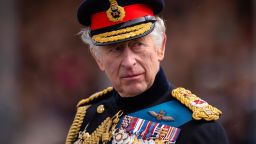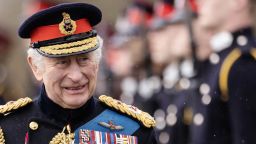Editor’s note: Keith Magee is senior fellow and visiting professor in cultural justice at University College London Institute for Innovation and Public Purpose. He is the author of “Prophetic Justice: Essays and Reflections on Race, Religion and Politics.” The views expressed in this commentary are his own. Read more opinion on CNN.
Can the first coronation in 70 years inspire patriotism in a nation facing a vastly reduced role on the global stage and a growing awareness of the ongoing harmful legacy of imperialism in the United Kingdom and beyond?

For King Charles III, his coronation Saturday at London’s Westminster Abbey was the culmination of a lifetime spent preparing to ascend to the throne. The British monarch is, in theory at least, a neutral figurehead with no political affiliations, no manifesto and no discernible allegiance to any side in the so-called culture wars.
As such, Charles must have hoped that these three days of coronation celebrations would enable the 150 million inhabitants of the UK and 14 other Commonwealth realms over which he reigns to revel in a shared sense of identity and destiny. But have they? In the four nations of the UK and farther afield, reactions to Saturday’s spectacular ceremony appear to have ranged widely from bemused indifference to proud delight to downright outrage.
For many British people, exasperated by recent royal controversies and scandals such as those involving Princes Harry and Andrew and distracted by a devastating cost of living crisis, the most important moment in Charles’ life will have had little or no impact on theirs. Although plenty of citizens won’t let growing levels of apathy about the monarchy and its rituals prevent them enjoying some good-natured coronation events through Monday, some may well ask themselves what it actually means to be British in 2023.
I know many of my close British friends and colleagues are pondering that very question. This is especially true of those whose skin is Black or brown and of their allies in the struggle for racial equality. The coronation ceremony, updated to include the leaders of a range of faiths and attended by guests of various ethnicities, was carefully orchestrated to reflect what Buckingham Palace has called “the modern, diverse Britain.”
However, it is difficult to buy into this parading of cherished diversity fully when report after report has revealed the shocking levels of systemic racism that blight every aspect of life for underserved minority communities in the UK, from maternity care to education and policing.
At the same time, new historical research (much of which has been carried out by The Guardian newspaper) is highlighting a spider’s web of direct links between the transatlantic slave trade and many of the pillars of British society.
State institutions, prestigious businesses, elite private schools, media outlets, entire industrial cities and many wealthy clans — including the monarchy — are being shown to have taken part in commissioning, organizing, funding and/or profiting from centuries of human trafficking. The terrible legacy of this manufacture of trauma on a grand scale is still with us.
Many of the closely intertwined global problems we face today — the gulf between the poorest and richest nations, the disproportionate impact of climate change on the most disadvantaged (and brownest) inhabitants of our planet, widespread racial and social injustice — can be traced back to the European empires of which Britain’s was the largest.
Meanwhile, the royal family’s vast wealth is being unfavorably exposed to close scrutiny in a process that is shining a spotlight on many priceless treasures, some of which were shamelessly pillaged from British colonies around the world.
In the UK, patriotic spirit has long drawn heavily on a fuzzy, idealized sense of the “glories” of this small island nation’s past, rooted in the imperial era when Britannia ruled the waves in the name of the monarch of the day.
The late Queen Elizabeth II’s coronation in 1953 took place against a backdrop of anxiety about what the loss of empire would mean for postwar Britain. Over the course of her reign, more than half of the former Commonwealth realms became republics. Seven more Caribbean countries are now thought to be likely to follow the same path soon. Urgent calls, for example from the intergovernmental organization Caribbean Community, or CARICOM, for the UK to engage with reparatory justice, are multiplying and are rapidly becoming impossible to ignore.
We all have the urge to belong to something bigger than just ourselves, our family or our immediate community. But when the weight of your country’s history becomes more like a burden than a badge of honor, how do you reconcile that with the desire to bond with your fellow citizens over a shared love of your homeland and of each other?
As a Black American, this is a struggle with which I have long grappled. It is hard to feel loyalty toward the nation that enslaved your ancestors or committed atrocities in your ancestors’ name. The answer, for me, has always been threefold: acknowledgement, reparation, hope. It means facing up to the wrongs of my country’s past while experiencing great pride in my fellow Americans’ efforts to put those wrongs right and never losing faith in our collective ability to build a more perfect union.
While institutional structures and the British state need to be held to account for the atrocities of Britain’s colonial past, the new monarch holds a unique dual position.
If not as head of state, then at least as head of his own family, King Charles should now move beyond mere expressions of “personal sorrow” and acknowledge the role of his predecessors in colonialism and slavery by issuing a formal apology. He should then seek to repair the damage done by embarking on a transparent process of reparatory justice such as the one CARICOM has championed.
Some British descendants of slave owners have already taken similar steps. If the sovereign joins them, other such families, organizations and eventually the UK government (despite its current stance) will surely follow suit.
If that happens, Charles might yet, like his mother at the time of her coronation, become the living embodiment of a nation’s hope for a better, fairer future at home and abroad. And perhaps his son’s coronation will take place in a country in which patriotism is honest and forward-looking, diversity is a source of genuine pride untainted by racial injustice and all the king’s subjects know what it means to be British.




